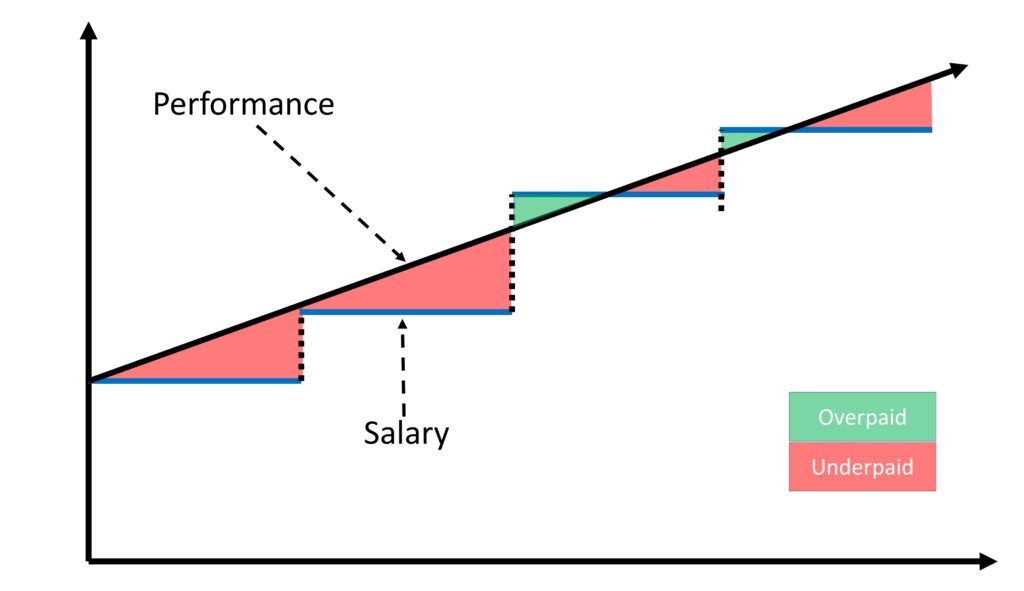…and maybe that is just right for you. Don’t be confused. I’m not saying that your salary should be low. What I’m saying is that if your performance is on a continuous rise, there will be periods of time (over 50% potentially) when your employer does not match performance with salary.
What does it mean?
How do I define underpaid? My interpretation is that the difference between how much you are worth and how much you make a month in USD defines this. This latter is quite straight forward. It is usually well defined at a company how much an employee at a certain level should make. This could be done through HAY grades or other predefined levels, but most frequently through job titles. For example at the United Nations, salaries are defined on a worldwide scale. If you are at a P4 level, you know what is your salary and you know how much you will earn next year. So if you perform at that level, you are in balance. Neither under- nor overpaid.
The only issues remaining to be discussed is how much you are worth. This will be more challenging…
How much you are worth
The answer to this question is highly subjective. I often see people claiming more than they are worth. Claiming they are super high performers, but in reality, they are just average. Sometimes less than that. Doing the job is what you get your current salary for, not your future salary. Obviously this is just my subjective opinion. There you go, I just proved that this is subjective 🙂
One might feel that doing their job well is outstanding. They might even get confirmation of them being an outstanding member of society. Mostly from family and friends though. Performance is often very difficult to measure because every situation and every circumstance is different.
Imagine you and your colleague John are both in new vehicle sales, both are regional VPs, both have the same salary, number of people, etc. You both have motivated people and are motivated towards an achievable goal. Your markets are similar in size and the average income of market participants. There is one difference. In your area, VAT on new car sales has recently increased, making them less attractive, signaling a potential fall in sales. This means that with the same effort, your performance should be lower. Your boss is aware of this. However, if you sell the same number of cars as John, you will be showing a higher relative performance.
By now you must see that an employee’s worth (defined as performance at the company) is never a self-proclaimed matter, rather an external evaluation made by people who are well aware of the circumstances.
You being underpaid
If under the above circumstances you are paid the same as John, you are underpaid, because clearly your efforts and bravura are at a higher level. You being underpaid will (hopefully) be recognized and your salary will be raised to a level more adequate to your accomplishments. This will be a mixture of what you have already reached (a sort of thank you for that) and what is expected from you, which is to keep up sales at this level. Finally, at year-end, you are not underpaid but paid properly. So to say, your employer adjusted for your performance and increased your salary to a level matching expectations from you.
Now imagine that a year later they introduce emission limitations in your area on new car sales, further worsening the situation. You keep selling the same number of cars, overperforming again, as the expectation was to simply keep up. In a worsening situation, this expectation should automatically be adjusted. So congratulations you are a great employee. And you are underpaid again…
Until the next time, your salary is raised. And so it goes, hopefully forever. Needless to say, this example is an extreme one, but I hopefully have proven my point. Salaries are for paying expected performance and are adjusted only once a year, usually.
How about the bonus?
Indeed, this is also part of the equation. But let’s be honest, unless you are at a C-level, the bonus will always be a fixed number multiplied by another one that varies from 80% to 120%. It almost never is 300% of that given fix. So even if you perform well above expectations and deliver 50% more than what you are required to, that will not be compensated that with a bonus. You will get a higher raise to show appreciation of what you are capable of. Then you are in the same cycle described above.
Now this will hurt
If you can recognize yourself in this story, please find below a visual representation of your life:

It’s difficult to accept the amount of red on the graph right? Somewhat frustrating, isn’t it. But I encourage you to overlook the temporary periods and focus on the final goal.
There could be cases where the performance arrow is less steep, flat, or even drop. It could change direction over the years as well. I don’t want to discuss those cases, that would be me losing focus and going too wide with the discussion. I will do that in a later post.
Conclusion
If you always seek to add value anywhere and everywhere, you are a natural high performer. And logically you will always be underpaid unless your salary is adjusted multiple times a year. This should not discourage you from being the person you are. An average person is naturally happier knowing his/her performance and salary matches. That can be satisfying for many and I don’t claim it is bad. Just be conscious and don’t complain in 20-30 years, when you find yourself living that average life.
Disclaimer: if you feel that bits and pieces are missing here, you are right. You cannot cover such a wide topic in a blog post. I haven’t mentioned personal satisfaction of the job done, economic hardships that might be surrounding you and your company, family issues, gender gap and millions of other matters which should be taken into consideration. I also haven’t discussed being unfairly underpaid, getting less for the same job as others are doing, for that there is an article that I quoted below. My aim was to be thought-provoking, now it’s your turn to have those additional thoughts.
References used:
Business News Daily – What to Do if You Think You’re Underpaid (January 15, 2020) https://www.businessnewsdaily.com/11167-what-to-do-if-underpaid.html
People Centre – Hay Job Evaluation Methodology: An Overview (July 5, 2016) https://peoplecentre.wordpress.com/2016/07/05/hay-job-evaluation-methodology-an-overview/
United Nations – Salaries, allowances, benefits and job classification (September 13, 2020) https://www.un.org/Depts/OHRM/salaries_allowances/salary.htm



